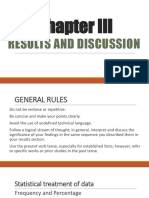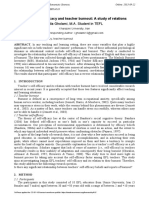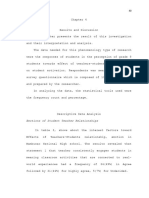26-03-2020-5. Case Study
26-03-2020-5. Case Study
Uploaded by
Sandhya Kumari SinghCopyright:
Available Formats
26-03-2020-5. Case Study
26-03-2020-5. Case Study
Uploaded by
Sandhya Kumari SinghOriginal Title
Copyright
Available Formats
Share this document
Did you find this document useful?
Is this content inappropriate?
Copyright:
Available Formats
26-03-2020-5. Case Study
26-03-2020-5. Case Study
Uploaded by
Sandhya Kumari SinghCopyright:
Available Formats
3.
4 Emotional maturity of the Student Teachers: age Wise
Dependent Independent Age Group N Mean % of Variance t
Variable Variable Mean
ANOVA SUMMARY
Emotional 25 &Below 27 185.74 77.392 527.892 1.236*
Maturity Age
Above 25 33 192.30 80.125 509.030
Source of Variation Sum of Square df Mean Square
Between Groups 639.495 1 639.495
Within groups 30014.155 58 517.485
Total 30653.650 59
*No Significant at 0.05 level, NB: Accept the Null Hypothesis
Table 4: Age wise, Emotional Maturity of the Student Teachers
Fig 4 : Age wise, Emotional Maturity of the Student Teachers
The mean Emotional Maturity score of the student teachers belonging to age group 25 years
and below is 185.74 with varience 527.892 and age group of above 25 years is 192.30 with
varience 509.030. There is n significant difference at 0.05 level, hence we accept the null
hypothesis.
In contrast with the present study findings, A. Arya(1984)in his study also found that there is no
significant influence on age on Emotional Maturity.
Thus, H02: There would be no significance varience between age wise student teacher group ie i)
25 years and below and ii) 25 years above with respect to Emotional Maturity.
3.5 Influence of Marital Status on Emotional Maturity of the Student Teachers
Dependent Independent Description N Mean % of Variance t
Variable Variable Mean
Emotional Marital Married 11 198.64 82.767 461.655 10511*
Maturity Status
Unmarried 49 187.27 78.03 518.241
*Significant at 0.05 level, NB: Reject the Null hypothesis
Table5 : Influence of Marital Status on Emotional Maturity of the Student Teachers
Fig5 : Influence of Marital Status on Emotional Maturity of the Student Teachers
From Table:5, the mean and variance of married shows 198.64 and 461.655 and for unmarried
it is 187.27 and 518.241 respectively which reflects that unmarried students trainee are slightly
more unstable in Emotional Maturity than married one, The null hypothesis is rejected as no
significant at 0.05 level.
People who are married are healthier in all aspects ( psychologically, physically and mentally)
than those who are not either single or divorced. This could be because marriage binds a
human being within the ambit of a fimaly life, It gives a sence of purpose by binding one to
certain duties, marriage calls for compromise, adjustment and is at times to certain disasters,
tragedy and pain.
Hence, H03: There would be no significant difference between married and unmarried student
teachers with respect to their Emotional Maturity is rejected.
You might also like
- Appraisal Ce Exam 5 Review PDFDocument30 pagesAppraisal Ce Exam 5 Review PDFAmeerNo ratings yet
- 10 - Chapter 4Document242 pages10 - Chapter 4Zenith xNo ratings yet
- 3 PagesDocument4 pages3 PagesAsir LNo ratings yet
- Chapter 4+5 Group ResearchDocument10 pagesChapter 4+5 Group Researchshaguftashabba136No ratings yet
- Happiness, Life - Satisfaction and Self - Esteem of Single Women Across AgesDocument27 pagesHappiness, Life - Satisfaction and Self - Esteem of Single Women Across AgesRoxanne NaguinlinNo ratings yet
- Chapter III Results and DiscussionDocument10 pagesChapter III Results and DiscussionShairuz Caesar Briones DugayNo ratings yet
- Sandigan Chap 4 5 NewDocument9 pagesSandigan Chap 4 5 Newnadjeralamada14No ratings yet
- A Case Study On Emotional Maturity LevelDocument11 pagesA Case Study On Emotional Maturity LevelaradhitajhaNo ratings yet
- Psycho-Social Factors Causing StressDocument7 pagesPsycho-Social Factors Causing StressKavitha KrishnanNo ratings yet
- 21-Article Text-49-1-10-20191123Document5 pages21-Article Text-49-1-10-20191123Jaya RoseNo ratings yet
- Difference of EQ To SEP 2Document7 pagesDifference of EQ To SEP 2Jona AddatuNo ratings yet
- A Study of Emotional Adjustment and Academic Achievement Among Selected High School Students in Coimbatore DistrictDocument5 pagesA Study of Emotional Adjustment and Academic Achievement Among Selected High School Students in Coimbatore DistrictAbhijeet DandageNo ratings yet
- Results and Discussion ResearchDocument16 pagesResults and Discussion Researchalbert sucalipNo ratings yet
- Chapter IVDocument24 pagesChapter IVsweetyyjavier288No ratings yet
- Skala Kematangan Emosi PrakashDocument4 pagesSkala Kematangan Emosi PrakashJoshua DionNo ratings yet
- Autoeficacia y Burnout Prof de Inglés IraníesDocument4 pagesAutoeficacia y Burnout Prof de Inglés IraníesFederico LópezNo ratings yet
- Manual For Adjustment Inventory For Scho PDFDocument3 pagesManual For Adjustment Inventory For Scho PDFSumit SinghNo ratings yet
- Final Defense Group 13Document16 pagesFinal Defense Group 13marialouisalexandriacoNo ratings yet
- Age Teaching Rushton Horner Psychology Aging 6 1989Document4 pagesAge Teaching Rushton Horner Psychology Aging 6 1989Yo AsakuraNo ratings yet
- Teachers' Job Satisfaction Levels: Zülfü DemirtaúDocument5 pagesTeachers' Job Satisfaction Levels: Zülfü DemirtaúRichelle BatacNo ratings yet
- Burnout in Relation To Gender, Teaching Experience, and Educational Level Among EducatorsDocument6 pagesBurnout in Relation To Gender, Teaching Experience, and Educational Level Among EducatorschenzNo ratings yet
- Resilience and Perceived Stress Predictors of Life Satisfaction in The Students of Success and FailureDocument5 pagesResilience and Perceived Stress Predictors of Life Satisfaction in The Students of Success and FailureCarla Si MarianNo ratings yet
- Chapter 4 TemplateDocument5 pagesChapter 4 TemplateVanna SEARTNo ratings yet
- Eaw Fe Question Paper 201516Document9 pagesEaw Fe Question Paper 201516Ahmed AlameinNo ratings yet
- Research FinalDocument38 pagesResearch FinalDiannah Anne Cuevas ZendonNo ratings yet
- Egc 811 Principles of Interpersonal RelationshipDocument70 pagesEgc 811 Principles of Interpersonal RelationshipolotuokefeliciaNo ratings yet
- Amoni and Final Chapter 4 Results and Discussion RecoverDocument12 pagesAmoni and Final Chapter 4 Results and Discussion Recovergoldenskydrive1No ratings yet
- Self-Esteem Among Pre-Retirees and Retirees From Secondary Education in The Departments of Atacora and Donga (Benin)Document13 pagesSelf-Esteem Among Pre-Retirees and Retirees From Secondary Education in The Departments of Atacora and Donga (Benin)International Journal of Innovative Science and Research TechnologyNo ratings yet
- 14-07-2021-1626247783-6-Impact - Ijrhal-5. Ijrhal - A Study of Emotional Maturity Among The Higher Secondary Students Level in Tiruppur DistrictDocument6 pages14-07-2021-1626247783-6-Impact - Ijrhal-5. Ijrhal - A Study of Emotional Maturity Among The Higher Secondary Students Level in Tiruppur DistrictImpact JournalsNo ratings yet
- The Effect of Gender and Marital Status On Burnout of English Teacher in Iran Dr. Azadeh AsgariDocument15 pagesThe Effect of Gender and Marital Status On Burnout of English Teacher in Iran Dr. Azadeh AsgariDr. Azadeh Asgari100% (1)
- Teaching QuestnDocument52 pagesTeaching Questnsdiwan21100% (1)
- Chapter FourDocument9 pagesChapter Fourndahjonathan62No ratings yet
- Psychol Psychother - 2021 - Yela - Reductions in Experiential Avoidance Explain Changes in Anxiety Depression andDocument21 pagesPsychol Psychother - 2021 - Yela - Reductions in Experiential Avoidance Explain Changes in Anxiety Depression andifclarinNo ratings yet
- Anxiety and Mental Health of Higher SecoDocument4 pagesAnxiety and Mental Health of Higher Secotanzeelarahman31No ratings yet
- Irena Smetackova 2017 - Auto y Burnout INTERDocument14 pagesIrena Smetackova 2017 - Auto y Burnout INTERJorge DueñasNo ratings yet
- Brite Toolkit eDocument4 pagesBrite Toolkit eapi-425784694No ratings yet
- Teacher Frustration and Emotion Regulation in University Language TeachingDocument20 pagesTeacher Frustration and Emotion Regulation in University Language Teachingritsumei2020yukiNo ratings yet
- Are You Experiencing Teacher Burnout? A Synthesis of Research Reveals Conventional Prevention and Spiritual HealingDocument7 pagesAre You Experiencing Teacher Burnout? A Synthesis of Research Reveals Conventional Prevention and Spiritual HealingDaniela Arsenova LazarovaNo ratings yet
- Journal Analysis 1Document4 pagesJournal Analysis 1Crisse Diane OngsingcoNo ratings yet
- Stress, Burnout & Support: DR Joel RoacheDocument29 pagesStress, Burnout & Support: DR Joel RoachePrincy AgrawalNo ratings yet
- 2.2 LBH Article Mahendar Kakkerala & Dr. V. Vasudevan (2) Article 3Document4 pages2.2 LBH Article Mahendar Kakkerala & Dr. V. Vasudevan (2) Article 3mahendar kakkerlaNo ratings yet
- Ijeefus - Influence of Home Environment and Type of School On EmotionalDocument6 pagesIjeefus - Influence of Home Environment and Type of School On EmotionalTJPRC PublicationsNo ratings yet
- Relationship Between Emotional Intelligence and Leadership Behavior Among Secondary School TeachersDocument11 pagesRelationship Between Emotional Intelligence and Leadership Behavior Among Secondary School TeachersMadan Kumar.sNo ratings yet
- Social-Emotional Loneliness and Life SatisfactionDocument5 pagesSocial-Emotional Loneliness and Life SatisfactionFatiya RahmahNo ratings yet
- Psychological Test 3 - AdjustmentDocument6 pagesPsychological Test 3 - AdjustmentZhea TamannaNo ratings yet
- Chapter IiiDocument7 pagesChapter IiiKasmawati YonnediNo ratings yet
- Relationship Between High School Teachers WellbeiDocument9 pagesRelationship Between High School Teachers WellbeiVette Angelikka Dela CruzNo ratings yet
- Research student engagementDocument19 pagesResearch student engagementJase BantayNo ratings yet
- Stress Factors and The Teaching Performance of The College FacultyDocument5 pagesStress Factors and The Teaching Performance of The College FacultyMaria ManyalacNo ratings yet
- Values Affecting Student Motivation: A Case Study: Sahalu@ccse - Kfupm.edu - SaDocument17 pagesValues Affecting Student Motivation: A Case Study: Sahalu@ccse - Kfupm.edu - Saghela00No ratings yet
- Occupational Stress and Coping Strategies Among Secondary School TeachersDocument6 pagesOccupational Stress and Coping Strategies Among Secondary School TeachersKavitha Krishnan100% (1)
- Chapter IiiDocument11 pagesChapter IiiJOANA JandogNo ratings yet
- 22MPLAA66 - Rachael SamanthaDocument5 pages22MPLAA66 - Rachael SamanthaRachael SamanthaNo ratings yet
- 4 Ijesraug20184Document8 pages4 Ijesraug20184TJPRC PublicationsNo ratings yet
- Satisfied and Dissatisfied Commitment: Teachers in Three GenerationsDocument31 pagesSatisfied and Dissatisfied Commitment: Teachers in Three GenerationsSasi Rega ArumugamNo ratings yet
- MHW Cia 2Document16 pagesMHW Cia 2ROOHI HASHMI 2237644No ratings yet
- Masters ThesisDocument19 pagesMasters ThesisRawnak JahanNo ratings yet
- PJ Questionnaire FOR PRINTINGDocument3 pagesPJ Questionnaire FOR PRINTINGAiron PorlayNo ratings yet
- Chapter 4 Research: Quantitative ResearchDocument5 pagesChapter 4 Research: Quantitative ResearchTrixiaNo ratings yet
- Chapter 4Document13 pagesChapter 4Onii ChanNo ratings yet
- A Different Kind of Teacher: A practical guide to understanding and resolving difficulties within the schoolFrom EverandA Different Kind of Teacher: A practical guide to understanding and resolving difficulties within the schoolRating: 4 out of 5 stars4/5 (1)
- 143_RRB_JE_MCQ_Industrial_MCQ_RRB_INDUSTRIAL_MANAGEMENT_FOR_ - CopyDocument72 pages143_RRB_JE_MCQ_Industrial_MCQ_RRB_INDUSTRIAL_MANAGEMENT_FOR_ - CopybcggNo ratings yet
- Pump-Pipe Systems Design-1Document64 pagesPump-Pipe Systems Design-1Neetor TendekayiNo ratings yet
- BTECDocument2 pagesBTECJoshu WainNo ratings yet
- Newtonian Telescope Collimation With The Astrosystems Lightpipe/Sighttube and AutocollimatorDocument10 pagesNewtonian Telescope Collimation With The Astrosystems Lightpipe/Sighttube and AutocollimatorScott CareyNo ratings yet
- Second Law of ThermodynamicsDocument33 pagesSecond Law of ThermodynamicsSInowritaNo ratings yet
- Morepen Laboratories Press Release Q1Document5 pagesMorepen Laboratories Press Release Q1gaurav chaudharyNo ratings yet
- Working With Indigenous Students AssignmentDocument4 pagesWorking With Indigenous Students Assignmentapi-314846713No ratings yet
- Tap Drill Size PDFDocument2 pagesTap Drill Size PDFAndres AriasNo ratings yet
- Flash & Fire PointsDocument2 pagesFlash & Fire PointsMalik ZainNo ratings yet
- Speakout Writing Extra Pre-Intermediate Unit 11Document1 pageSpeakout Writing Extra Pre-Intermediate Unit 11Наташа ОлейникNo ratings yet
- Extinction of Experience The Need To Be More SpeciDocument7 pagesExtinction of Experience The Need To Be More Specimdarbaazalam30No ratings yet
- Kamed English Teacher. Present Perfect PDFDocument46 pagesKamed English Teacher. Present Perfect PDFKamed GarciaNo ratings yet
- Project Task Review All MaterialDocument3 pagesProject Task Review All MaterialNadella AmeliaNo ratings yet
- Bs English 6th Introduction to SemanticsDocument8 pagesBs English 6th Introduction to SemanticsMuhammad RamzanNo ratings yet
- Artificial IseminationDocument6 pagesArtificial IseminationHafiz Muhammad Zain-Ul AbedinNo ratings yet
- Derek Dodson PHDDocument342 pagesDerek Dodson PHDraokin2No ratings yet
- Hindalco SenddddddddddDocument54 pagesHindalco SenddddddddddSuvasish KajuriNo ratings yet
- PNLE Prep.Document23 pagesPNLE Prep.Darnell Adrian EstobioNo ratings yet
- Application of FMEA of A Ceramic Tiles Manufacturing Plant PDFDocument17 pagesApplication of FMEA of A Ceramic Tiles Manufacturing Plant PDFnsrinNo ratings yet
- Ubd Lesson Plan: Vital InformationDocument4 pagesUbd Lesson Plan: Vital Informationapi-322101445No ratings yet
- New Range. New Rules.: Transforming The Industry Creating Customer Value Powering A Historic Navy VesselDocument24 pagesNew Range. New Rules.: Transforming The Industry Creating Customer Value Powering A Historic Navy VesselBoris ȚepeșNo ratings yet
- 2051-1812 PortablePropaneHtrs 400 Dpi 508 01-19-22Document36 pages2051-1812 PortablePropaneHtrs 400 Dpi 508 01-19-22alexNo ratings yet
- How To Build Double Shed Doors - HowToSpecialist - How To Build, Step by Step DIY PlansDocument12 pagesHow To Build Double Shed Doors - HowToSpecialist - How To Build, Step by Step DIY PlansriverbendfcNo ratings yet
- Visa Process Guide (002) 2.3 PDFDocument5 pagesVisa Process Guide (002) 2.3 PDFALI haiderNo ratings yet
- 1.Man-Online Banking Services and Customer Satisfaction-Dr Pallavi MehtaDocument6 pages1.Man-Online Banking Services and Customer Satisfaction-Dr Pallavi MehtaImpact JournalsNo ratings yet
- Classification of DietsDocument4 pagesClassification of DietssyhnzNo ratings yet
- 6941 - 77388 - Bartov, E., Faurel, L., & Mohanram, P. S. (2016) - Can Twitter Help Predict Firm-Level Earnings and Stock ReturnsDocument43 pages6941 - 77388 - Bartov, E., Faurel, L., & Mohanram, P. S. (2016) - Can Twitter Help Predict Firm-Level Earnings and Stock ReturnsLulut KhusnawatiNo ratings yet
- plcpp04Document25 pagesplcpp04Rahul ChandiramaniNo ratings yet
- TOS IKAAPAT Markahang Pagsusulit G10Document2 pagesTOS IKAAPAT Markahang Pagsusulit G10Queenie Rose BalitaanNo ratings yet

























































































